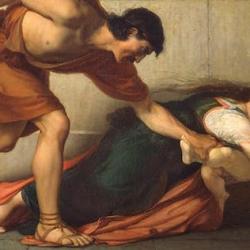Should we expect our political leaders to be saints?
There’s a case for saying No. We might begin by making a distinction between private morality and the use of public authority. The ethical question that’s relevant to a political leader is the latter: Is he going to abuse power? What he does with whom in his bedroom or during downtime in the Oval Office doesn’t matter, at least not as much.
But is private morality so easily distinguished from public ethics? Can we trust someone who lies, bullies, and manipulates to cover up the embarrassment of private sin? Doesn’t such a person prove himself a liar? Hasn’t he proven that he lacks the basic public virtue of justice?
A tyrant uses public authority to pursue his own ends, whether enrichment or sheer expansion of power. But isn’t public self-centeredness just self-centeredness writ large?
The link between private immorality and abuse of public authority is often even more direct. There’s good reason to think that Clinton and Kennedy, and probably others, deployed people on the public payroll to cover for them.
One might mount a more contextual argument: In our current political circumstances, we cannot expect our leaders to be saints. Our culture is too decadent and corrupt. Political culture is so degraded that it prevents good men and women from making political progress.
Or, more generally: Democracy forces imperfect choices on us. In a monarchy, we have no say in who take the crown. But when we vote, we have to make decisions about the relative merits of the candidates. If we are perfectionists and wait for the perfect candidate, we’ll never vote.
There is certainly force in these arguments. We do cast votes for platforms and policy trajectories, rather than persons. A personally immoral legislator who works to save the lives of unborn babies does a public service.
But this isn’t a nailed-shut case either. Persons implement platforms and policies, and unreliable persons can be unreliable on policy.
Here we can find some wisdom in the Christian tradition. From the first, Christian political theology has emphasized the need for kings to cultivate personal holiness and virtue.
Augustine argued that a king has to be master of himself before he can master people, and should “prefer mastery over their base desires” to lordship of nations. Christian rulers rule well when they “offer to their true God the sacrifice of humility and mercy and prayer” for their sins.
According to Thomas (de Regno) tyranny arises from the ever-shifting, ever-expanding desires of the tyrant. Under a tyrant, men become fearful and servile. In this portrait of the tyrant, we can discern the outlines of Thomas’s more positive vision of good rule, the “selflessness” essential to the just exercise of political power.
John of Salisbury cites Deuteronomy 17 to support his exhortation that the law should be implanted on the mind of the king (Policraticus 4.6). For John, attitude to law is the distinguishing mark separating the prince and the tyrant: The Prince “is obedient to law, and rules his people by a will that places itself at their service, and administers rewards and burdens within the republic under guidance of law,” while the tyrant flouts the law and pursues only his own good (Policraticus 4.1).
Lester Born (“The Perfect Prince,” Speculum 1928) sums up John’s portrait of the prince, mixing performance of justice and other public virtues with a demand for personal holiness:
“[He] should be chaste and avoid avarice (iv, 5); he should be learned in letters (iv, 6); he should be humble (iv, 7); he should banish from his realm actors and mimes, buffoons and harlots (iv, 4); he should seek the welfare of others and not his own (iv, 8); he should wholly forget the affections of flesh and blood and do only that which is demanded by the welfare and safety of his subjects; he should be both father and husband to them (iv, 3); he should correct their errors with the proper remedies (iv, 8); he should be affable of speech and generous in conferring benefits; he should temper justice with mercy (iv, 8); . . . he must avoid levity (vi, 23); he is charged with the disposal of the means of the public welfare (vi, 24); and is the dispenser of honour (vi, 26); he must not close his ear to the cries of the poor (vi, 27); he must raise aloft the roof-tree of the Church and extend abroad the worship of religion (vi, 2); he must protect the Church against sacrilege and rapine (vi, 13); and finally, he must ever strive so to rule that in the whole community over which he presides none shall be sorrowful (vi, 6)” (472-3).
According to Gilbert of Tournai (Eruditio Regnum et Principum), “Humility is one of the most essential qualities in a prince (i, 2, 9), and he should be virtuous (i, 1, 10), for his wicked acts are copied by everyone” (summarized by Born, 479). William Perrault makes the same points in his Eruditione Principum: “The prince should often stop to think what he is, who he is, and what sort of creature he is (iii, 6).1 He should be of good character (vi, 7), mild (vi, 1), truthful (i, 7; i, 13; vi, 1), just in his relations with his subjects, and content with his income (vi, 1). He should always act so as to be a pattern for his subjects (vi, 7). Above all he should not be so concerned with the welfare of others that he neglects the care of himself (iii, 1) – the greatest triumph is self conquest (v, 37) -for evil in the prince is widely diffused by his wicked example (vi, 7)” (summarized in Born, 485).
The tradition continued to Erasmus, who argues in his Education of a Christian Prince that the prince’s good character is more important even than the good character of princes and bishops: “The studies and character of priests and bishops are a potent factor in this matter, I admit, but not nearly so much so as are those of princes. Men are more ready to decry the clergy if they sin than they are to emulate them in their good points. So it is that monks who are really pious do not excite people to follow their example because they seem only to be practicing what they preach. But on the other hand, if they are sinful everyone is shocked beyond measure. But there is no one who is not stimulated to follow in the footsteps of his prince! For this very reason the prince should take special care not to sin, because he makes so many followers in his wrongdoings, but rather to devote himself to being virtuous so that so many more good men may result.”
Matt Schmitz of First Things commented to me recently that the current Evangelical willingness to vote for politicians of (at best) questionable personal virtue may be a sign of the fracturing of American civil religion. If America is no longer the nation with the soul of a church, we don’t need saints running the place.
That may well be the case and, if so, it’s a welcome development. But as American Christians come to a more realistic assessment of America, we shouldn’t abandon the tradition that insists on an integral connection of private and public virtue.












